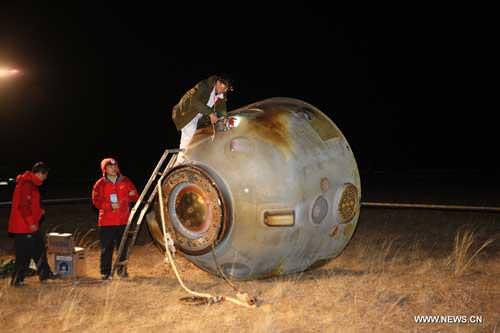[/caption]
China's historic first docking mission in space ended in a complete success today (Nov. 17) following the safe landing of the unmanned Shenzhou-8 in Inner Mongolia. Today's landing will robustly propel China's space program forward and sets the stage for an ambitious agenda of human spaceflight missions in 2012 to the Tiangong-1 Space Lab and eventually to a hefty 100 ton Earth orbiting Space Station to be assembled by 2020.
Shenzhou-8 was launched to low Earth orbit on Nov. 1 atop a Long March 2F booster from the Jiuquan Satellite Launch Center in the Gobi Desert and successfully conducted China's first ever rendezvous and docking mission in space with the nation's Tiangong-1 Space Lab module on Nov. 3 while orbiting some 343 kilometers in altitude above Earth.
Gen. Chang Wanquan, the Commander in Chief of China's human spaceflight program said, "The Shenzhou-8 capsule has safely returned to the main landing site at Inner Mongolia and the Tiangong-1/Shenzhou-8 rendezvous and docking mission has achieved full success!"
[caption id="attachment_91093" align="aligncenter" width="580" caption="The re-entry capsule of Shenzhou-8 spacecraft after landing in Inner Mongolia on Nov. 17,2011. "]
[/caption]
Chang leads the China Manned Space Engineering (CMSE) Project, the nation's human spaceflight program. He is the Commanding Officer of the Tiangong-1/Shenzhou-8 Rendezvous and Docking Mission Headquarters, and director of the PLA (Peoples Liberation Army) General Armaments Department. The People Liberation Army directs China's human spaceflight program.
Shenzhou-8 landed today at 7:30 pm. Beijing time in central Asia after flying nearly 17 days in earth orbit. Recovery crews reached the capsule within a few minutes of the parachute assisted touchdown.
Most of the flight was spent linked up to the Tiangong-1 Space Lab module - China's first prototype space station.
[caption id="attachment_91095" align="aligncenter" width="500" caption="Graphic shows the procedure of rendezvous and docking of Shenzhou-8 spacecraft and Tiangong-1 space lab module. Credit: Xinhua/Lu Zhe"]
[/caption]
After 12 days of joint orbital operations, Shenzhou-8 carried out a 2nd docking test to enable Chinese space engineers and mission controllers to gain further practice and experience in mastering the complex techniques involved in rendezvous and docking in space.
Shenzhou-8
disengaged from Tiangong-1 on Nov. 14, backed off to a distance of 140 meters (460 ft) and then carried out a re-docking about 30 minutes later. Controllers at the Beijing Aerospace Control Center monitored systems as Shenzhou-8 automatically re-approached Tiangong-1 for the second link up.
The main purpose of the second docking test was to confirm the performance of the rendezvous and docking procedures and hardware on Shenzhou-8 and Tiangong-1 under conditions of the glare of sunlight which are different compared to nighttime conditions of the first docking attempt.
Although the Shenzhou-8 flew unmanned during this flight, the capsule was fully human rated - even food and water are stored on board to simulate the presence of a human crew.
Today's success sets the stage for possibly two Chinese manned missions to follow in 2012, namely Shenzhou-9 and Shenzhou-10.
Each Shenzhou can carry two or three astronauts. One of the missions is highly likely to include the first female Chinese astronaut.
[caption id="attachment_91094" align="aligncenter" width="500" caption="China's unmanned spacecraft Shenzhou-8 landed by parachute in north China Thursday evening, Nov. 17"]
[/caption]
Read Ken's features about Shenzhou-8 & Tiangong-1
China completes 2nd Docking to Space Lab and sets Path to Manned flights in 2012
China Technology Surges Forward with Spectacular First Docking in Space
China launches Shenzhou-8 bound for Historic 1st Docking in Space
Shenzhou-8 rolled out for Blastoff to China's 1st Space Station on November 1
Bizarre Video: China's Tiangong 1 Space Lab Animation set to 'America the Beautiful' Soundtrack
China Blasts First Space Lab Tiangong 1 to Orbit
China set to 'Leap Forward in Space' as Tiangong 1 Rolls to Launch Pad
 Universe Today
Universe Today
